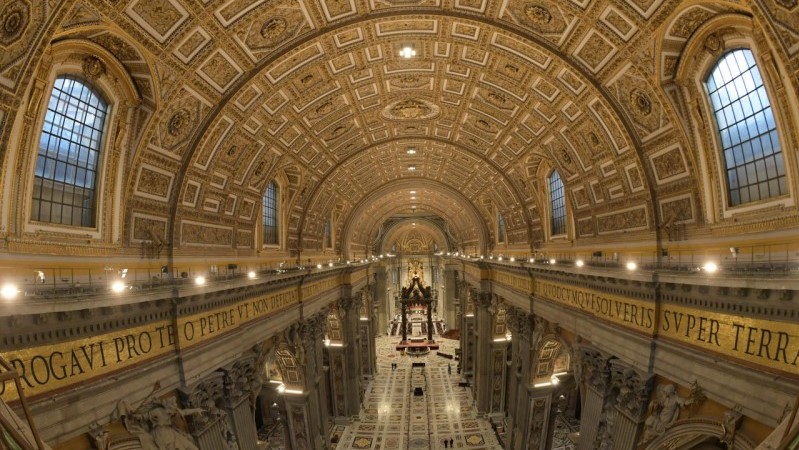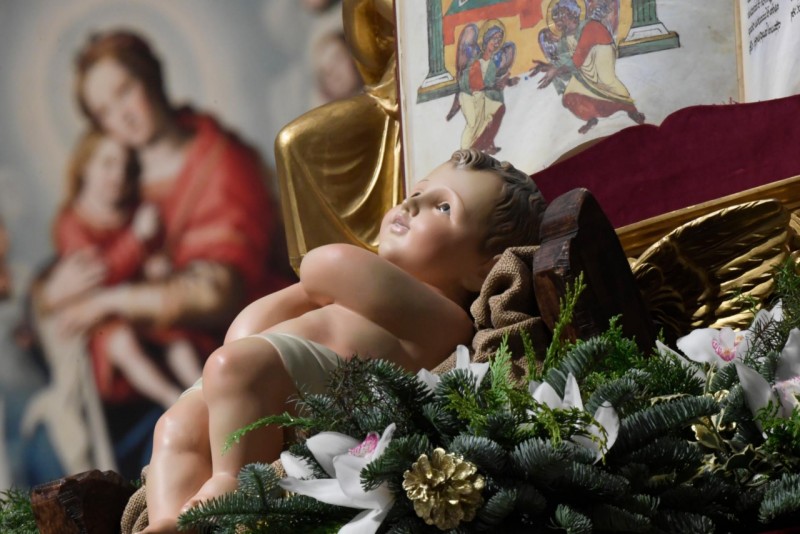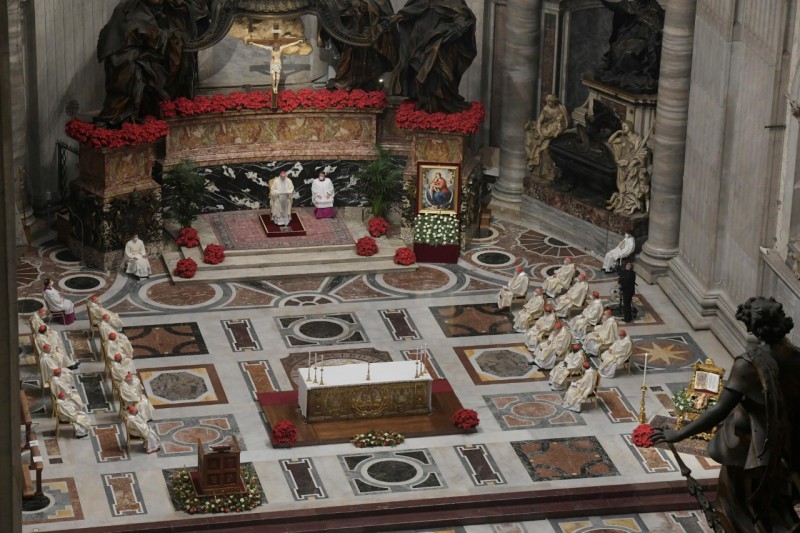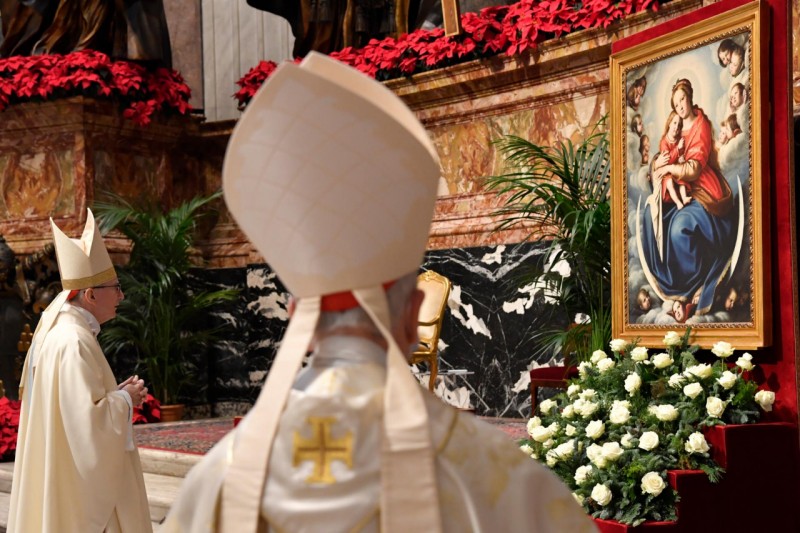Homily of His Holiness Pope Francis
Solemnity of Mary, Mother of God
54th World Day of Peace
Friday, 1 January 2021
Although Pope Francis was unable to attend Mass in St. Peter's Basilica for the Solemnity of Mary, Mother of God, due to a painful attack of sciatica, the homily he had prepared was read out during the Mass by Cardinal Pietro Parolin, who was celebrating the Mass in his place.
Read the full text of Pope Francis' homily below:
In the readings of today’s Mass, three verbs find their fulfilment in the Mother of God: to bless, to be born and to find.
To bless. In the Book of Numbers, the Lord tells his sacred ministers to bless his people: “Thus you shall bless the Israelites: You shall say to them, ‘The Lord bless you’” (6:23-24). This is no pious exhortation; it is a specific request. And it is important that, today too, priests constantly bless the People of God and that the faithful themselves be bearers of blessing; that they bless. The Lord knows how much we need to be blessed. The first thing he did after creating the world was to
say that everything was
good (
bene-dicere) and to
say of us that we were
very good. Now, however, with the Son of God we receive not only words of blessing, but the blessing itself: Jesus is himself the blessing of the Father. In him, Saint Paul tells us, the Father blesses us “with every blessing” (
Eph 1:3). Every time we open our hearts to Jesus, God’s blessing enters our lives.
Today we celebrate the Son of God, who is “blessed” by nature, who comes to us through his Mother, “blessed” by grace. In this way, Mary brings us God’s blessing. Wherever she is, Jesus comes to us. Therefore, we should welcome her like Saint Elizabeth who, immediately recognizing the blessing, cried out: “Blessed are you among women and blessed is the fruit of your womb!” (
Lk 1:42). We repeat those words every time we recite the
Hail Mary. In welcoming Mary, we receive a blessing, but we also learn to bless. Our Lady teaches us that blessings are received in order to be given. She, who was blessed, became a blessing for all those whom she met: for Elizabeth, for the newlyweds at Cana, for the Apostles in the Upper Room… We too are called to bless, to “speak well” in God’s name. Our world is gravely polluted by the way we “speak” and think “badly” of others, of society, of ourselves. Speaking badly corrupts and decays, whereas blessing restores life and gives the strength needed to begin anew each day. Let us ask the Mother of God for the grace to be joyful bearers of God’s blessing to others, as she is to us.
St. Peter's Basilica on the Solemnity of Mary, Mother of God, January 1, 2021. Photo courtesy of Vatican Media.
The second verb is
to be born. Saint Paul points out that the Son of God was “born of a woman” (
Gal 4:4). In these few words, he tells us something amazing: that the Lord was born like us. He did not appear on the scene as an adult, but as a child. He came into the world not on his own, but from a woman, after nine months in the womb of his Mother, from whom he allowed his humanity to be shaped. The heart of the Lord began to beat within Mary; the God of life drew oxygen from her. Ever since then, Mary has united us to God because
in her God bound himself to our flesh, and he has never left it. Saint Francis loved to say that Mary “made the Lord of Majesty our brother” (SAINT BONAVENTURE,
Legenda Maior, 9, 3). She is not only the bridge joining us to God; she is more. She is the road that God travelled in order to reach us, and the road that we must travel in order to reach him. Through Mary, we encounter God the way he wants us to: in tender love, in intimacy, in the flesh. For Jesus is not an abstract idea; he is real and incarnate; he was “born of a woman”, and quietly grew. Women know about this kind of quiet growth. We men tend to be abstract and want things right away. Women are concrete and know how to weave life’s threads with quiet patience. How many women, how many mothers, thus give birth and rebirth to life, offering the world a future!
We are in this world not to die, but to give life. The holy Mother of God teaches us that the first step in giving life to those around us is to cherish it within ourselves. Today’s Gospel tells us that Mary “kept all these things in her heart” (cf.
Lk 2:19). And goodness comes from the heart. How important it is to keep our hearts pure, to cultivate our interior life and to persevere in our prayer! How important it is to
educate our hearts to care, to
cherish the persons and things around us. Everything starts from this: from cherishing others, the world and creation. What good is it to know many persons and things if we fail to cherish them? This year, while we hope for new beginnings and new cures, let us not neglect
care. Together with a vaccine for our bodies, we need a vaccine for our hearts. That vaccine is care. This will be a good year if we take care of others, as Our Lady does with us.
Cardinal Pietro Parolin delivers the homily prepared by Pope Francis at Mass for the Solemnity of Mary, Mother of God, in St. Peter's Basilica on January 1, 2021. Photo courtesy of Vatican Media.
The third verb is
to find. The Gospel tells us that the shepherds “found Mary and Joseph and the child” (v. 16). They did not find miraculous and spectacular signs, but a simple family. Yet there they truly found God, who is grandeur in littleness, strength in tenderness. But how were the shepherds able to find this inconspicuous sign? They were called by an angel. We too would not have found God if we had not been called by grace. We could never have imagined such a God, born of a woman, who revolutionizes history with tender love. Yet by grace we did find him. And we discovered that his forgiveness brings new birth, his consolation enkindles hope, his presence bestows irrepressible joy. We found him but we must not lose sight of him. Indeed, the Lord is never found once and for all: each day he has to be found anew. The Gospel thus describes the shepherds as constantly on the lookout, constantly on the move: “they went with haste, they found, they made known, they returned, glorifying and praising God” (vv. 16-17.20). They were not passive, because to receive grace we have to be active.
What about ourselves? What are we called to find at the beginning of this year? It would be good to
find time for someone. Time is a treasure that all of us possess, yet we guard it jealously, since we want to use it only for ourselves. Let us ask for the grace to find time for God and for our neighbour – for those who are alone or suffering, for those who need someone to listen and show concern for them. If we can find time to give, we will be amazed and filled with joy, like the shepherds. May Our Lady, who brought God into the world of time, help us to be generous with our time. Holy Mother of God, to you we consecrate this New Year. You, who know how to cherish things in your heart, care for us, bless our time, and teach us to find time for God and for others. With joy and confidence, we acclaim you: Holy Mother of God! Amen.
Text courtesy of Libreria Editrice Vaticana (click here for original source)
Cardinal Pietro Parolin celebrates Mass in St. Peter's Basilica for the Solemnity of Mary, Mother of God on January 1, 2021. Photo courtesy of Vatican Media.



















